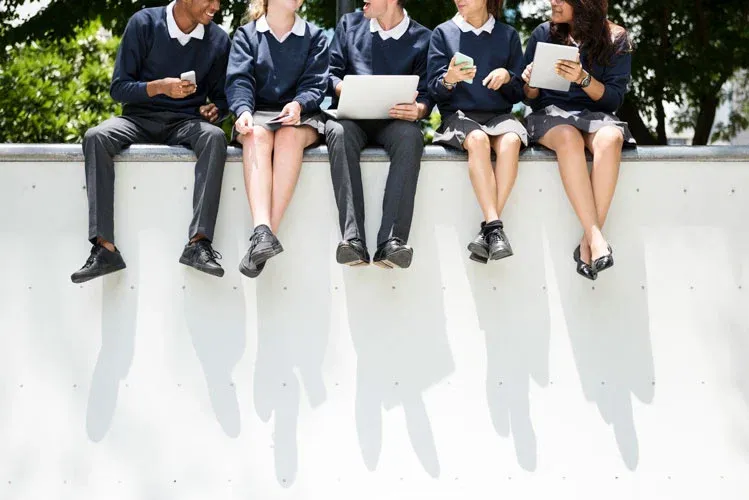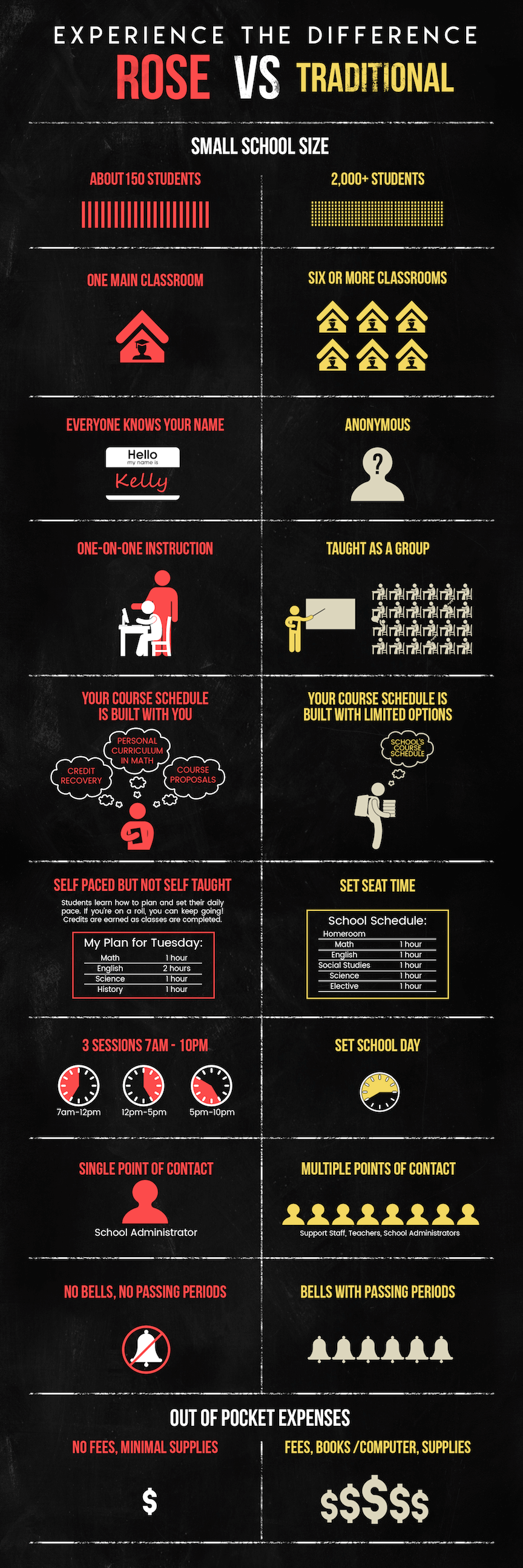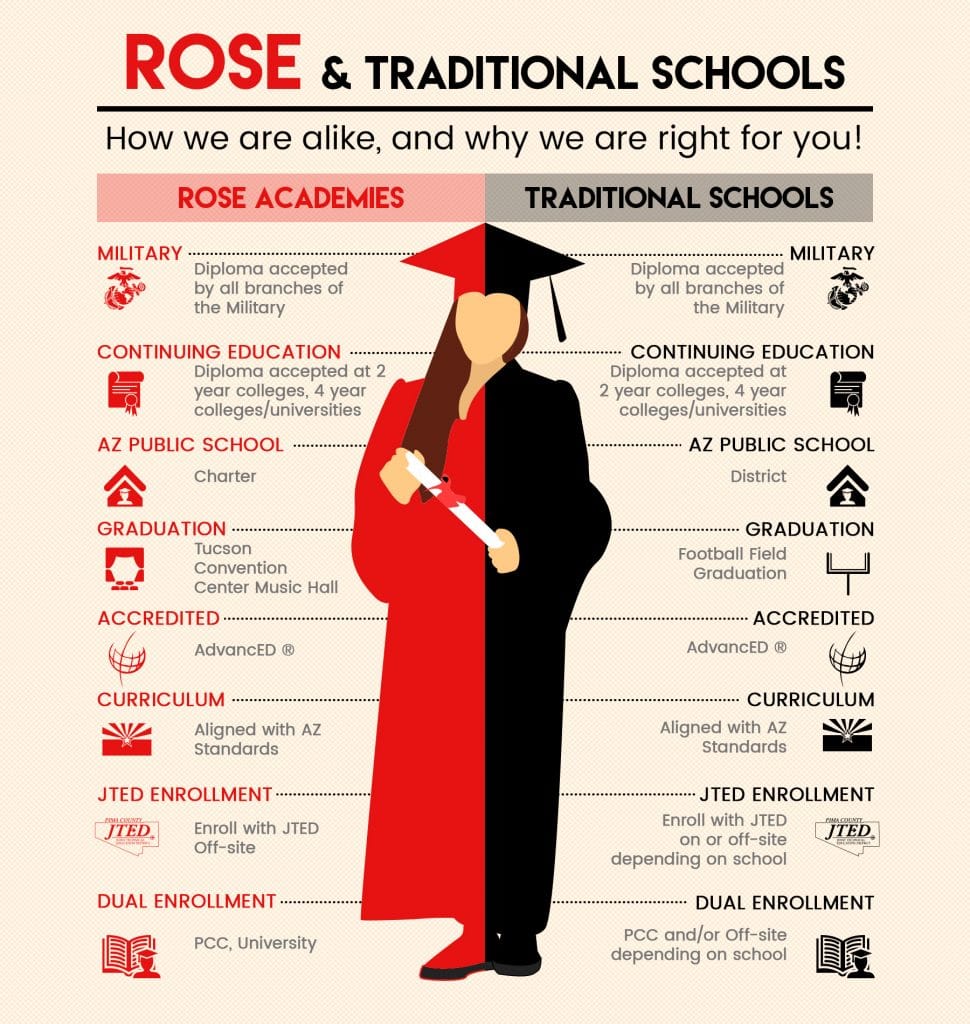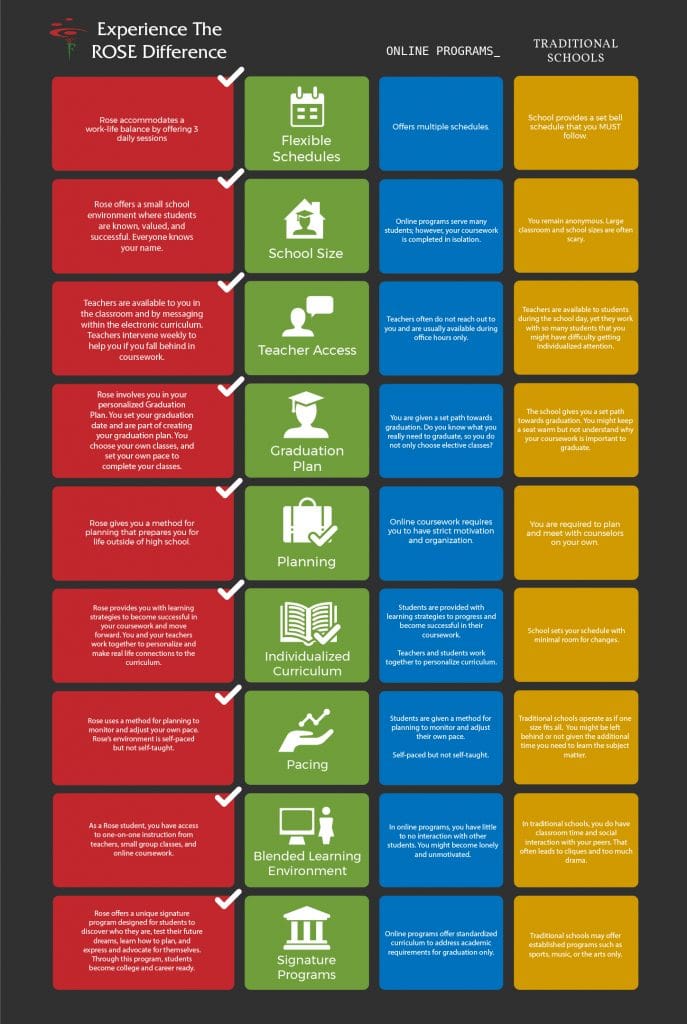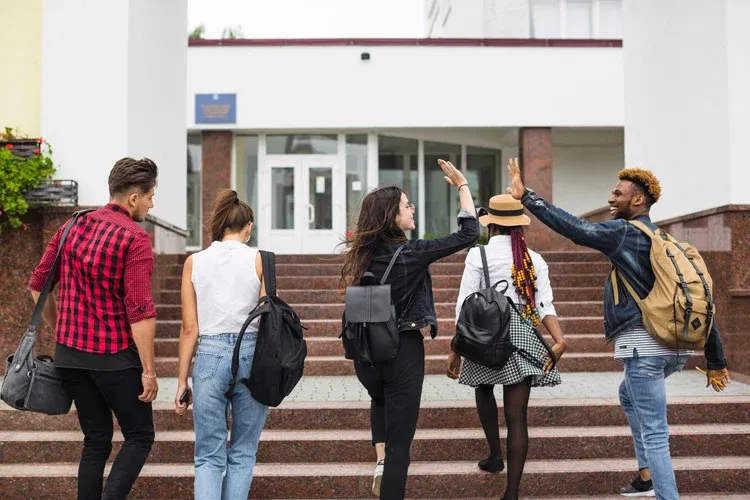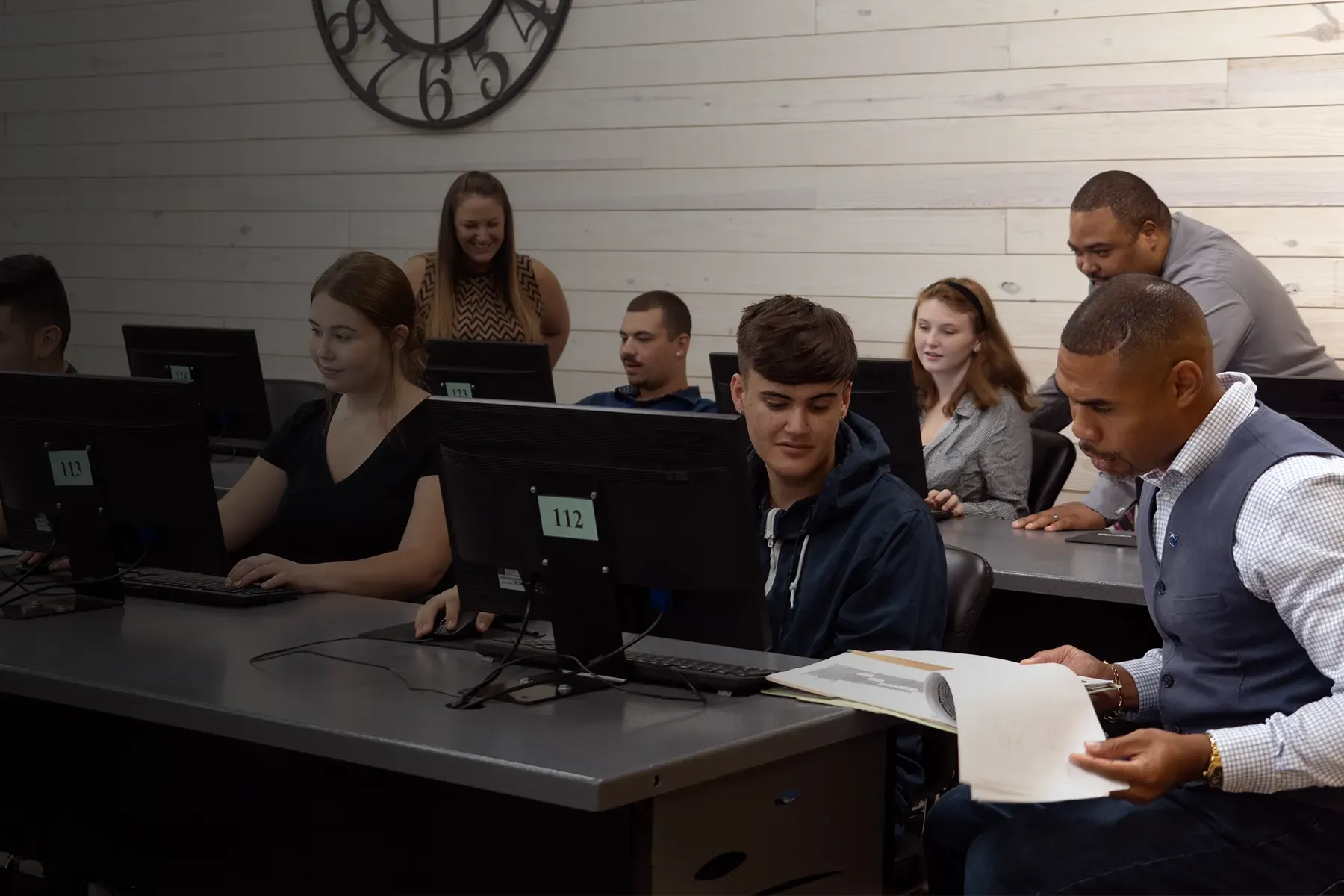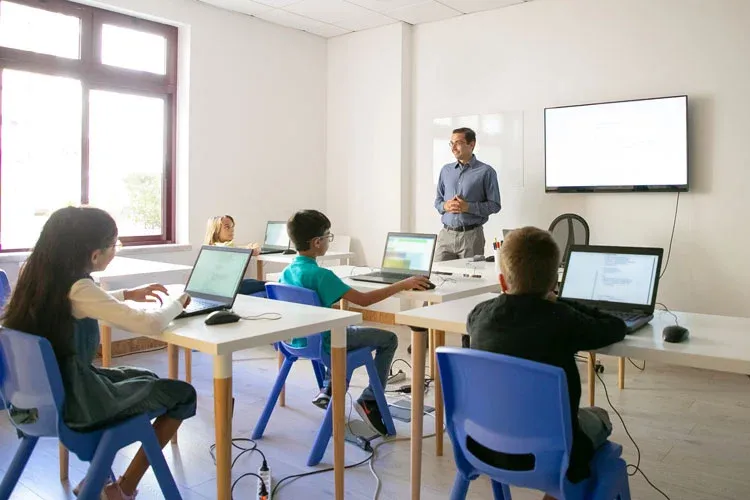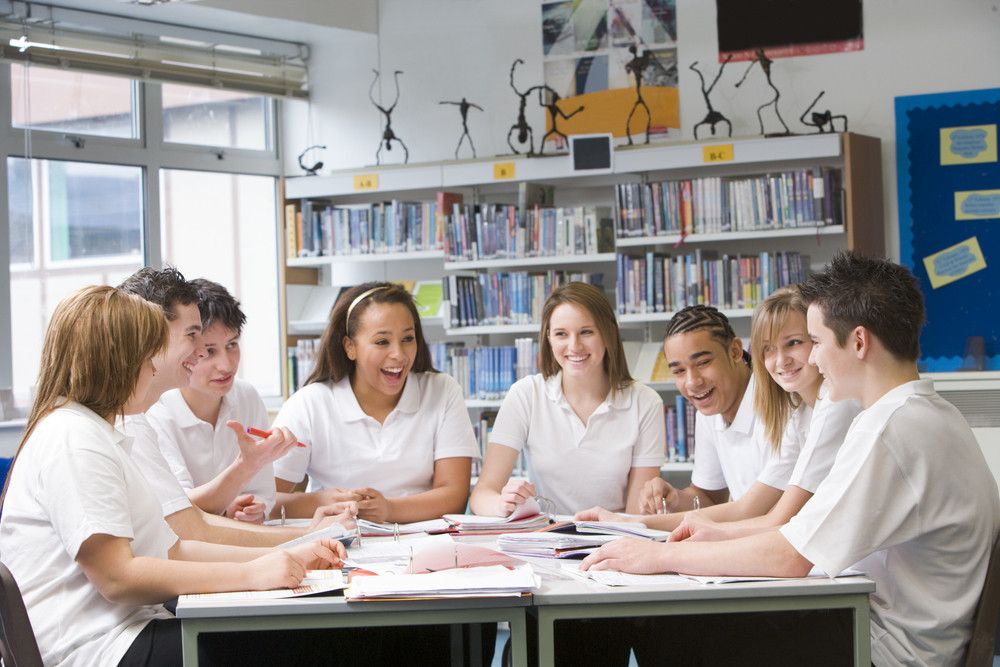At its most basic, “alternative high school” means students receive an education outside of the traditional high school format.
The Arizona Department of Education’s definition of “alternative high school” is a school whose sole and clearly-stated mission is to serve specific populations of at-risk students. This is a broad definition, and, because of that, alternative high school status must be applied for and approved by the Department of Education.
Contrary to traditional education, many alternative high schools in Arizona offer smaller class sizes, flexible scheduling options, and an overall more personalized experience.
How Alternative High Schools Differ from Traditional Campuses
Unlike a larger public school system, alternative high schools like Rose Academies offer a unique educational experience that differs significantly from traditional campuses. Our approach centers around self-paced courses, allowing students to learn at their own speed, which is often not possible in traditional public schools.
This personalized learning model ensures that each student receives the attention and support they need to succeed. Our smaller class sizes foster a close-knit community where students can thrive academically and socially, guiding them in reaching their full potential.
Types of Alternative High Schools
Each type of alternative school shares a common goal: to provide a flexible, supportive environment that helps students succeed. At Rose Academies, we specialize in credit recovery programs for students who are behind in their studies and need to catch up to receive their high school diploma. Because we are self-paced, students can also get ahead in their studies and graduate early!
Many alternative schools may focus on specific career paths, arts, or technical skills, providing specialized training and education. Some schools cater to students with unique learning needs, offering tailored support and resources.
Reasons to Enroll in an Alternative High School
Alternative schools serve high school students who may not thrive in traditional settings, offering a more personalized and supportive learning environment. Students at our school benefit from flexible scheduling, allowing them to balance education with other responsibilities. Additionally, our focus on individualized teaching methods helps students recover credits and graduate on time.
Learning Disabilities Make Traditional Settings Difficult
For students with learning disabilities, traditional school settings can be challenging and often overwhelming. At Rose Academies, we provide the necessary accommodations and support to ensure that these students can succeed.
Our self-paced courses allow students to learn at a comfortable speed, reducing stress and frustration. Our dedicated teachers are trained to work with students with various learning disabilities, offering personalized instruction and assistance. This supportive environment helps students build confidence and achieve their academic goals.
Social or Behavioral Challenges
Students facing social or behavioral challenges often find it difficult to succeed in traditional schools. Rose Academies offer a safe and understanding environment where these students can thrive. Our smaller class sizes allow us to individually address each student’s unique needs and challenges.
We emphasize positive behavior and social skills, helping students develop the tools they need to succeed both academically and personally. Our supportive community fosters a sense of belonging and acceptance, encouraging students to overcome their challenges and excel.
Life Circumstances
Life circumstances can sometimes make attending a traditional high school impractical or impossible. Whether it’s due to work commitments, family responsibilities, or other personal situations, Rose Academies provide the flexibility these students need.
We understand that each student’s situation is unique, and we strive to provide the support and resources necessary to help them succeed. By offering a customized educational experience, we help students achieve their goals and create better life opportunities.
Advantages of Alternative High Schools
1. Smaller Class Sizes
Smaller classes allow teachers to give students more individual attention and make it easier to tailor lessons to specific student needs. Fewer students mean less distraction and disciplinary issues compared to a large group of peers, and students are more likely to participate, as it’s more difficult to blend into the crowd.
2. More Flexible Scheduling Options
Rather than a set start and end time that applies to every student in the school, alternative high schools often offer more flexibility in a student’s daily academic schedule. This flexibility allows students to more easily work outside of school, catch up on material, or get ahead. This scheduling flexibility applies all the way to graduation, for those hoping to earn their diploma according to their own timeline.
3. Personalization to Learning Styles
At an alternative high school, personalization doesn’t stop at scheduling. Focus on the individual student expands all the way to curriculum and credit recovery. Students have more say as to what classes they take and when. This allows students to focus on a particular passion, as well as design their educational experience according to their current needs and goals.
At the Rose Academies free charter high schools, we offer smaller class sizes and designated workstations for each student. Three session times are offered throughout the day with morning, afternoon, and evening sessions; and our knowledgeable staff will work with you to discover the classes most needed to achieve graduation on your own time.
Choosing the Right Alternative High School
Selecting the right alternative high school for your child involves careful consideration of their unique needs and goals. It’s crucial to visit schools, meet teachers, and understand the curriculum to ensure it aligns with your child’s learning style.
Additionally, look for a school with a proven track record of helping students succeed academically and transition to higher education or careers. By thoroughly evaluating your options, you can make an informed decision that will best support your child’s future.
How Colleges Look at Alternative High Schools
Colleges increasingly recognize the value of alternative high schools and the unique strengths their graduates bring. Our rigorous curriculum and emphasis on fundamental skills prepare students for the demands of college coursework.
Furthermore, alternative high school graduates demonstrate strong self-motivation and independent learning abilities, making them attractive candidates for college admissions. By attending an alternative high school, your student can establish a solid educational and social foundation and stand out to college admissions boards.
Determining if an Alternative High School is Right for You or Your Child
Deciding whether an alternative school experience is the best fit for you or your child requires careful reflection on their educational needs and social circumstances. Consider factors such as your child’s learning style, their need for a flexible schedule, and any social or behavioral challenges they may face.
It’s also important to assess the school’s approach to personalized education and support services. By weighing these considerations, you can determine if an alternative high school is the ideal environment for your child to achieve their social and academic goals.
At Rose Academies, our curriculum is self-paced, but not self-taught, and we are always enrolling. Explore our website to discover what an alternative education could look like for your child.
